Why GPS Is Essential…..
In today’s fast-moving and technology-driven world, the Global Positioning System (GPS) has become one of the most essential tools for both vehicles and human beings. What once was a luxury or limited to military use has now become a daily necessity for ordinary people. From helping us find directions to ensuring safety and tracking loved ones, GPS plays a crucial role in our daily lives. This article explores why GPS is not only useful but essential for both vehicles and human beings.

What is GPS?
GPS stands for Global Positioning System, a network of satellites operated by the United States government that provides location and time information to a GPS receiver anywhere on Earth. Whether it’s a smartphone, smartwatch, or a vehicle navigation system, GPS allows the user to determine their exact location within seconds. It works 24/7 in any weather conditions and is freely accessible to anyone with a GPS receiver.
Importance of GPS for Vehicles
1. Navigation and Route Planning
One of the most common uses of GPS in vehicles is for navigation. Drivers no longer have to rely on paper maps or ask strangers for directions. With GPS apps like Google Maps or Waze, a driver can easily plan a route, find the shortest or fastest way, and even avoid traffic jams. This is especially helpful in unfamiliar areas or during long road trips.
2. Real-Time Traffic Updates
Modern GPS systems provide real-time traffic information. They can detect traffic congestion, road accidents, or construction zones and suggest alternative routes. This helps drivers save time, fuel, and stress. In urban areas, this is particularly useful where traffic is a daily struggle.
3. Vehicle Tracking and Theft Recovery
For vehicle owners, especially commercial fleets and delivery services, GPS tracking is essential. It helps monitor the location of vehicles, their speed, route taken, and more. If a vehicle is stolen, the GPS tracker can help the authorities locate and recover it quickly. Car rental companies and logistics businesses depend heavily on this feature.
For vehicle owners, especially commercial fleets and delivery services, GPS tracking is essential. It helps monitor the location of vehicles, their speed, route taken, and more. If a vehicle is stolen, the GPS tracker can help the authorities locate and recover it quickly. Car rental companies and logistics businesses depend heavily on this feature.
4. Fuel Efficiency and Cost Management
By using GPS, drivers can plan better routes, avoid idling in traffic, and reduce unnecessary travel. This not only saves fuel but also lowers maintenance costs. Fleet managers use GPS data to improve driving habits and reduce operational expenses.
5. Emergency Assistance
In case of an accident or breakdown, GPS helps emergency services locate the exact position of the vehicle. Many modern cars come with built-in GPS emergency call features (e.g., eCall in Europe), which automatically notify nearby emergency responders after a crash, providing faster assistance.

Importance of GPS for Human Beings
1. Personal Navigation and Daily Use
Almost everyone today carries a smartphone with GPS. Whether walking, cycling, or using public transport, GPS helps individuals reach their destination with ease. It also helps find nearby services like ATMs, restaurants, hospitals, or petrol pumps.
2. Fitness and Health Tracking
Fitness apps and smartwatches use GPS to track physical activities such as running, cycling, hiking, or walking. They measure distance, speed, and route taken, which helps users monitor their health and fitness progress. Apps like Strava, Fitbit, or Apple Health rely on GPS technology.
3. Safety for Children and Elderly
Parents use GPS devices to track their children’s location in real time, ensuring their safety when they are alone or going to school. Similarly, GPS trackers are used for elderly people, especially those suffering from dementia or Alzheimer’s, helping caregivers know where they are at all times.
4. Disaster Management and Rescue
In natural disasters such as earthquakes, floods, or storms, GPS plays a crucial role in locating affected people and guiding rescue teams to the right areas. It helps save lives by providing accurate coordinates, even in remote areas where traditional maps are not useful.
5. Time Synchronization
Few people realize that GPS also provides precise time data, which is important for activities that depend on accurate timing like online banking, electricity grids, stock trading, and telecommunications. Without GPS, the global digital infrastructure could not run smoothly.
How GPS is Changing Our World
GPS technology has changed not just how we move, but also how we live and work. From transportation and security to agriculture and aviation, GPS is part of almost every industry. Farmers use GPS to guide tractors with centimeter-level precision. Pilots rely on GPS to navigate flights. Even delivery apps like Zomato, Swiggy, and Amazon use GPS to bring products to our doorstep.
In smart cities, GPS is used to manage traffic, monitor public transport, and plan urban development. With the rise of autonomous vehicles (self-driving cars), GPS becomes even more vital for safe navigation and coordination with traffic systems.
The Future of GPS
The future of GPS is even more promising. With technologies like 5G, Internet of Things (IoT), and Artificial Intelligence (AI), GPS systems are becoming more accurate and responsive. India’s own regional GPS system, called NavIC (Navigation with Indian Constellation), is being developed by ISRO and aims to enhance local GPS services.
Soon, we may see GPS-controlled drones, smart helmets with GPS for bikers, and advanced medical alert systems that use GPS to notify hospitals in emergencies.
Conclusion
In conclusion, GPS has become a fundamental part of modern life. For vehicles, it offers better navigation, safety, and efficiency. For individuals, it provides security, convenience, and control. From saving time and fuel to protecting our loved ones, the benefits of GPS are too important to ignore.
In a world where time, safety, and information are critical, GPS is not just helpful—it is essential. As we continue to rely more on technology, the role of GPS in our daily lives will only grow stronger.